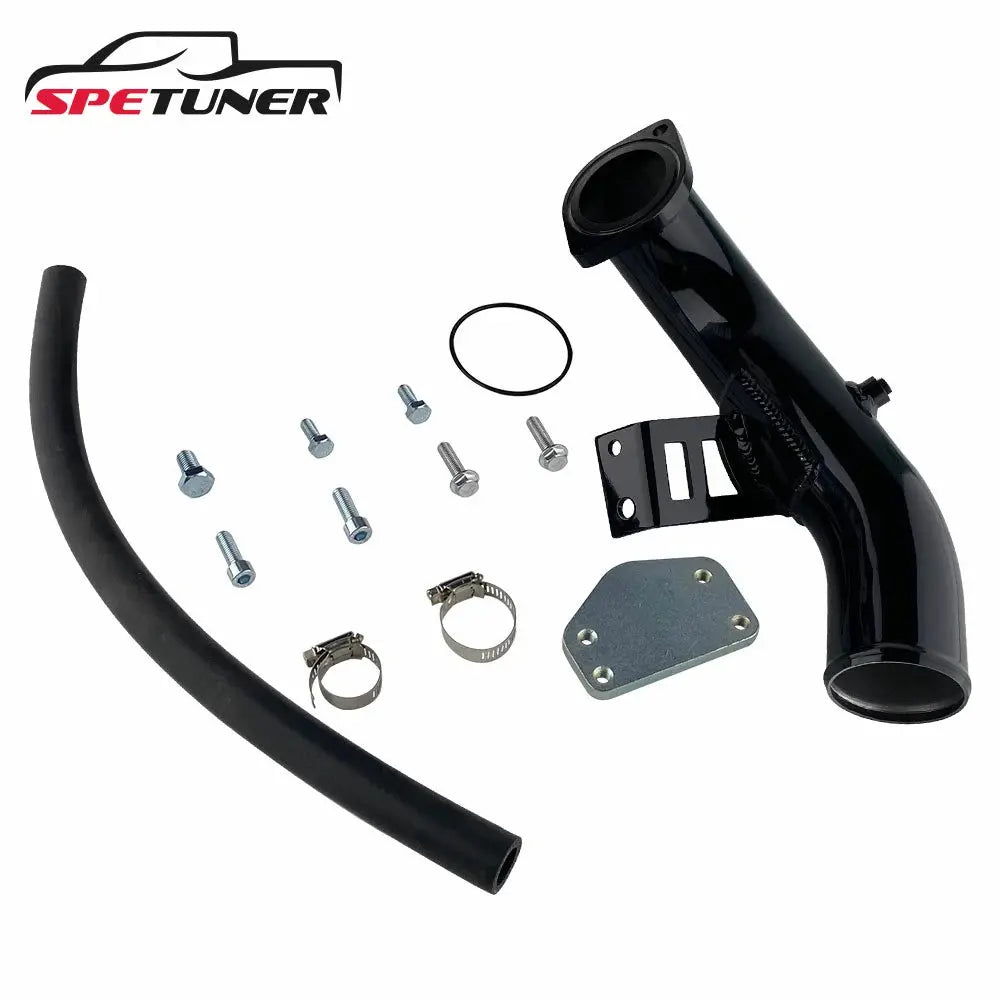Hey everyone, welcome back to the channel! Today, we’re tackling an EGR Delete installation on a LLY 2004-2005 6.6L Duramax With High Flow Intake.This modification is ideal for anyone looking to improve engine performance, reduce carbon buildup, and eliminate some of the common reliability issues associated with the EGR system.
Before we dive in, here are a couple of quick disclaimers: EGR deletes are for off-road use only. If you’re building a race truck or using your vehicle on private property, this is a great upgrade. Just make sure you have a tuner ready to program your truck, as the EGR delete will trigger a check engine light unless the system is tuned to disable EGR codes.
Step-by-Step Installation Process
Step 1: Preparation
Disconnect the Batteries
Always start by disconnecting the negative terminals on both batteries. This is essential for safety and prevents electrical issues while working on your truck.
Remove the Air Intake Pipe
Loosen the clamps and bolts holding the air intake pipe in place. Once removed, you’ll have better access to the EGR cooler and intake components.
Drain Coolant
- Use a drain pan to catch the coolant as you disconnect the lower radiator hose. For this process, you only need to drain a few liters, just enough to prevent spills when removing the EGR cooler.
- If your truck still has the stock radiator, you may find that GM didn’t include an easy coolant drain port. In that case, you’ll need to disconnect a hose near the radiator to let the coolant flow out.

Step 2: Removing the EGR Cooler
Disconnect Electrical Components
Begin by unplugging all nearby electrical connectors, including the coolant level sensor and A/C wiring. Move the wiring harness to the side to create a clear workspace.
Remove the PCV Piping
The PCV pipes connect to both valve covers and the turbo intake horn. Use a 10mm wrench to remove the bolts and a V-band clamp to detach the piping. Set it aside.
Cut the Coolant Hoses
Since these hoses will be replaced with new ones, use an Exacto knife to cut them for faster removal. This avoids the hassle of trying to preserve old hoses that will no longer be used.
Unbolt and Remove the EGR Cooler
- The EGR cooler is secured with several bolts. Loosen and remove them, then use a pry bar if necessary to detach the cooler from its mounting points.
- Once removed, inspect the cooler and intake horn for carbon buildup. The amount of soot in these components highlights why this modification is beneficial.
Pro Tip: Keep track of all bolts and small components during removal to make reassembly easier.

Step 3: Modify or Replace the Up Pipe
Remove the Up Pipe
Disconnect the up pipe from the turbo and exhaust manifold. These connections are secured with bolts in a triangle configuration. Use a handheld torch to loosen stubborn bolts if necessary.
Modify the Factory Pipe
Use a grinder to cut off the EGR branch from the factory up pipe. Weld a solid cap over the opening, then apply high-temperature anti-corrosion paint to protect the weld from rust and heat damage.
Install the Modified Up Pipe
Reattach the modified up pipe to the turbo and exhaust manifold using the original gaskets, if in good condition, and anti-seize on all bolts to prevent future issues.
Alternative: If you prefer to avoid welding, consider upgrading to a SPETUNER up pipe specifically designed without an EGR branch.

Step 4: Replace the Downpipe
Remove the Factory Downpipe
Start by removing the turbo heat shield to access the V-band clamp holding the downpipe. Loosen the clamp and maneuver the downpipe out through the frame or underside.
Install a High-Flow Downpipe
Align and secure the SPETUNER high-flow downpipe for improved airflow. Tighten all connections to ensure no leaks.
Pro Tip: A high-flow downpipe is not just easier to install but also provides significant performance gains compared to the restrictive factory pipe.

Step 5: Install Blocker Plates
Clean the Intake Horn Ports
Use carburetor cleaner and a wire brush to remove all carbon deposits from the intake horn ports.
Secure the Blocker Plates
Position the SPETUNER blocker plates over the cleaned ports and tighten them using the provided bolts and spacers. Ensure they are flush to prevent any air or coolant leaks.

Step 6: Install the New Coolant Line
Route and Connect the Line
Replace the old coolant hoses with the SPETUNER pre-measured line. Connect it from the firewall to the radiator and secure it with clamps.
Refill and Bleed the Coolant System
Refill the coolant system and bleed any trapped air by loosening the thermostat housing bleed screw. Once coolant flows steadily, tighten the screw.

Step 7: Final Reassembly
- Reinstall the turbo intake horn, PCV piping, and air intake pipe.
- Reconnect all electrical wiring and sensors.
- Double-check all bolts, clamps, and connections.
Pro Tips and Notes
- Use anti-seize on all bolts during reassembly to simplify future maintenance.
- Always double-check the tightness of clamps and bolts to avoid leaks or loose connections.
- A high-quality tuner is essential to disable the EGR system codes and ensure the engine runs smoothly after the modification.
Video Reference for Installation:
Disclaimer: This video is referenced for educational purposes only and remains the property of its creator. Full credit goes to Dark Iron Diesel for their expertise and efforts.
Conclusion
This LLY Duramax EGR delete kit is a straightforward but rewarding upgrade that enhances engine performance, reduces carbon buildup, and improves reliability. With the SPETUNER EGR delete kits, you’re not just removing a problematic system—you’re optimizing your truck for long-term success.

For more details or a visual reference, watch the original video by Dark Iron Diesel on YouTube. Their expertise complements the step-by-step guide here, offering a clear demonstration of the process.
FAQs
Q1: What is the purpose of installing an LLY Duramax EGR Delete Kit?
A1: Installing an LLY Duramax EGR Delete Kit improves engine efficiency by reducing exhaust backpressure, eliminating carbon buildup, and increasing reliability.
Q2: Is the LLY EGR Delete Kit legal for on-road use?
A2: No, the LLY EGR Delete Kit is designed for off-road use only and may not comply with on-road emissions regulations.
Q3: Do I need a tuner to install an LLY Duramax EGR Delete Kit?
A3: Yes, a tuner is required to disable EGR-related fault codes and prevent a check engine light after installation.
Q4: Will installing an LLY EGR Delete Kit improve fuel economy?
A4: While results may vary, many users report improved fuel efficiency due to better airflow and reduced carbon buildup.
Q5: Can I install an LLY Duramax EGR Delete Kit without professional help?
A5: Yes, the installation can be done as a DIY project with the right tools and a detailed guide, but mechanical experience is recommended.
Q6: Does the LLY EGR Delete Kit include all necessary components?
A6: Most kits, including SPETUNER’s, come with blocker plates, coolant lines, and all necessary hardware for installation.
Q7: What are the risks of not modifying or replacing the up pipe during installation?
A7: Failing to address the up pipe EGR branch may lead to increased backpressure and potential pipe failure over time.
Q8: How long does it take to install an LLY Duramax EGR Delete Kit?
A8: Installation typically takes 4-6 hours, depending on experience and whether welding is required.
Q9: Will installing an LLY EGR Delete Kit cause engine overheating?
A9: No, when properly installed, the EGR delete kit improves coolant flow and reduces strain on the cooling system.
Q10: What performance benefits can I expect from an LLY Duramax EGR Delete Kit?
A10: Benefits include reduced exhaust backpressure, better engine efficiency, lower carbon buildup, and improved reliability for off-road use.









